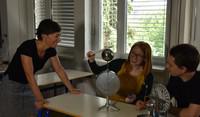 Success in the 21
st
century is determined by one’s ability to pose problems and seek multiple
solutions, to evaluate assumptions, and to cope with uncertainty in the answer.
People who can work in a team and communicate will be more successful than
those who know a lot of information.
Success in the 21
st
century is determined by one’s ability to pose problems and seek multiple
solutions, to evaluate assumptions, and to cope with uncertainty in the answer.
People who can work in a team and communicate will be more successful than
those who know a lot of information.
Around the world the knowledge of content (conceptual and quantitative) stops being the only goal of education. The engagement in the processes of science emerges as another equally important goal. How do we help our students achieve both? In this talk I will describe a learning system for physics courses that naturally and seamlessly engages students in the above practices and help them develop the capabilities and can be implemented without major revisions to the infrastructure.
The learning system, called Investigative Science Learning Environment (ISLE), helps student learn physics by systematically engaging them in the processes that mirror the practice of physics. It is based on the findings of brain research and physics educations research and is supported by a set of comprehensive curriculum materials and numerous studies of student learning.
Download event poster in pdf format .

